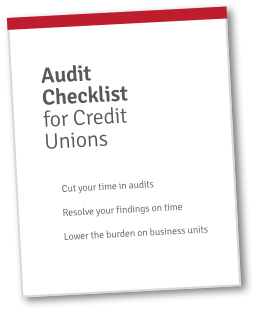Audits must be performed frequently to ensure proper operational practices and compliance. Most upper-level credit union employees are familiar with audits. After all, upper-level employees are the experts, and leveraging experts is a critical component to successful audits.
Then, of course, there are internal audit teams. They’ve made a living off of their audit expertise.
So, with so many experienced experts on any given audit team, what do you get?
You get sound credit union audit programs and, one would hope, great audit results.
Credit Union Audit Programs Could Still Be Better
But here’s the thing:
There’s always room for improvement.
Nobody likes to admit it, but it’s true. There’s rarely such a thing as “perfect.” Even then, the consensus about what constitutes perfection is often relative (or it changes over time).
What that means for credit union audit programs is that a highly-efficient, sound audit program might still have room for improvement. Even if an audit team is operating at 100%, introducing new variables might turn that 100% into an 80%.
New variables—such as new goals, tools, or techniques in auditing—might increase a credit union audit program’s capacity for efficiency.
Here’s to New Variables
Credit union audit software brings structure and automation into any audit program. With audit software, many manual tasks no longer require extensive manual input. Also, communication, tracking and management, archival and storage, building a robust audit trail, and generating reports all get streamlined.
Reducing the manual workload has helped credit unions decrease the time it takes to complete an audit by anywhere from 10 – 25%!
How These New Variables Came About
The Takeaway
As more credit unions used our audit management software, we saw a trend:
They were credit unions with an already sound audit program. They weren’t using our software to fix a broken system—they were using it to improve further upon a working one.
There are many bottlenecks in the audit process that can’t be addressed by simply “doing better.” There’s a point at which humans can’t perform manual tasks as quickly as a computer can. That’s where Redboard’s automation comes in.
Essentially, even the best credit union audit programs have room for improvement.

FREE: Audit Checklist for Credit Unions
4 key principles and 9 questions to jumpstart your audit planning. From leading credit unions.Next Steps for Credit Union Audit Programs
If you’d like to learn more about credit union audit and compliance issues, follow the links below. We also have a useful credit union audit checklist to keep you and your team on track during your next audit.
Or, if you’d like to learn more about Redboard’s audit management software, you can request a demo.
How the NCUA Aires Questionnaires Can Help Your Credit Union Prepare for Your Next Regulatory Examination
The Hidden Risks in Credit Union Regulatory Examinations - And How to Avoid Them





